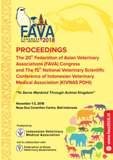FA-2 Gastrointestinal Diseases of Pigs: Diarrhoea Pre-Weaned Pig in Breeder Area
Abstract
All phases of pig raising are important, from the time of the womb, the prestarter, the starter, the grower, the finisher, the sires (sow), and the males (boar), all related to each other to produce maximum performance. However, the initial phase of pig breeding is indeed a phase most important.
In this phase, the state of the digestive tract is still relatively sterile from microorganisms, does not have a good body temperature regulation system, immune system is not functioning well so vulnerable to the presence of infectious diseases from outside in the initial phase, piglets tend to be environmentally sensitive and easy to stress.
The symptoms of diarrhoea (scours) at the time of pre-wean, weaning or change of feed is necessary to watch out for. In theory, diarrhea is a disease of gastrointestinal disease (enteritis) that attacks many piglets or young pigs, caused by several factors:
*Non-infections, such as sudden weaning stress, weather changes (from summer to rainy season or vice versa), cage displacement, density, poor cage sanitation, starving and sudden change of feed in pigs to be weaned.
*Infection, such as bacterial (colibacillosis), viral (coronavirus), or parasitic disease (coccidiosis).
At the time of weaning, piglet has a high risk of stress because it is psychologically separate from the mother. Stress increases as pigs also have to adapt to the environment and the type of feed from the normally wet becomes more complex and dry.
In addition, in the digestive tract, the piglet has changed the size of the surface of the small intestine villi to be shorter so that it affects the digestibility and absorption capacity of the feed. Another consequence is the presence of changes in the immune system and intestinal microflora so that if there is a beneficial bacterial imbalance, can cause the occurrence of diarrhea.

